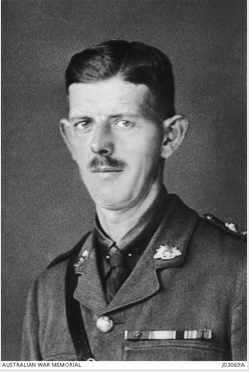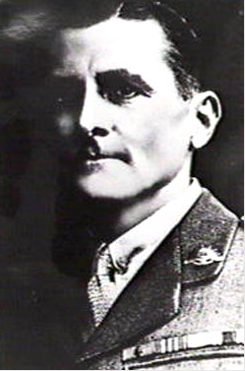Brigadier Arthur Blackburn VC, CMG, CBE, ED, JP (1892 - 1960, 67yo)
 Arthur Blackburn's military career was marked by remarkable service and courage, rising from the rank of Private to Brigadier. Born in Woodville, South Australia, Blackburn studied law before enlisting in the Australian Imperial Force in August 1914. He was posted to the 10th Battalion and was among the first to land at ANZAC Cove on 25 April 1915. Alongside another scout, he was credited with penetrating furthest inland during the initial landings.
Arthur Blackburn's military career was marked by remarkable service and courage, rising from the rank of Private to Brigadier. Born in Woodville, South Australia, Blackburn studied law before enlisting in the Australian Imperial Force in August 1914. He was posted to the 10th Battalion and was among the first to land at ANZAC Cove on 25 April 1915. Alongside another scout, he was credited with penetrating furthest inland during the initial landings.
Commissioned as a Second Lieutenant in August 1915, Blackburn served throughout the Gallipoli campaign and was later deployed to the Western Front in France. On 23 July 1916, during the Battle of Pozières, he led a group of fifty men in an attack against a heavily fortified enemy position. Under intense resistance, Blackburn spearheaded four successive bombing parties, capturing approximately 366 metres of trench and neutralising an enemy strongpoint. Many of the men involved were killed, but the assault was a success. For his extraordinary leadership and bravery, Blackburn was awarded the Victoria Cross.
He returned to Adelaide on 22 March 1917 and resumed his legal career. From 1917 to 1921, he served as the founding member and President of the Returned Sailors', Soldiers', and Airmen's Imperial League of Australia (South Australia branch).
Blackburn continued to serve in the militia and was promoted to Lieutenant Colonel in 1939, taking command of a Motorized Cavalry Regiment. In 1940, he left legal practice once again to command the 2nd/3rd Australian Machine-Gun Battalion, which saw action in Syria in 1941. On 21 June 1941, Blackburn, as the senior Allied officer, accepted the surrender of Damascus.
In early 1942, with Japanese forces advancing rapidly through Southeast Asia, Blackburn was promoted to temporary Brigadier and sent to Java. There, he was placed in command of an ad hoc force known as "Black Force," tasked with supporting Dutch resistance. Despite fierce efforts, the Allied forces were compelled to surrender after three weeks. Blackburn spent the remainder of the war as a prisoner until his release in September 1945.
He died suddenly on 24 November 1960 and was buried with full military honours at West Terrace Cemetery in Adelaide.
Captain Albert Borella VC, MM (1881 - 1968, 87yo)

Albert Borella was born in Borung, Victoria, and spent his early years working as a farmer. He began his military journey as a part-time soldier in the Victorian Rangers, serving for 18 months. In 1910, he became a firefighter in Melbourne, and by 1913, he had moved to the Northern Territory, where he worked near the Daly River.
Borella enlisted in the Australian Imperial Force in March 1915 and was one of the first 15 volunteers from the Northern Territory to sign up for active service. Assigned to the 26th Battalion, he trained in Egypt before landing at Gallipoli on 12 September 1915. Promoted to Corporal, he remained on the peninsula until the evacuation in November.
In March 1916, the 26th Battalion was deployed to the Western Front. Borella advanced to the rank of Sergeant in January 1917 and was awarded the Military Medal in March for gallantry at Malt Trench, Warlencourt. He received his commission as a Second Lieutenant on 7 April 1917.
He fought in key battles including Morlancourt and Hamel, and on 17 July 1918, he demonstrated exceptional bravery at Villers-Bretonneux. During an assault on an enemy support trench, Borella noticed a machine-gun firing through the Australian barrage. Without hesitation, he ran ahead of his men into the barrage, killed the enemy crew with his revolver, and captured the gun. He then led a small team to assault a fortified trench, bombed two dugouts, and took thirty prisoners. For these actions, he was awarded the Victoria Cross.
At the start of the Second World War, Borella was appointed a Lieutenant in the 12th Australian Garrison Battalion. In 1941, he was posted to the Prisoner of War Group at Rushworth, and on 1 September 1942, he was promoted to Captain. He later served with the 51st Garrison Company at Myrtleford until his discharge in 1945.
Albert Borella passed away on 7 February 1968 in Albury, where he was buried with full military honours. His legacy is commemorated with streets named in his honour in both Albury and Canberra.
Last Reviewed 05/2025









